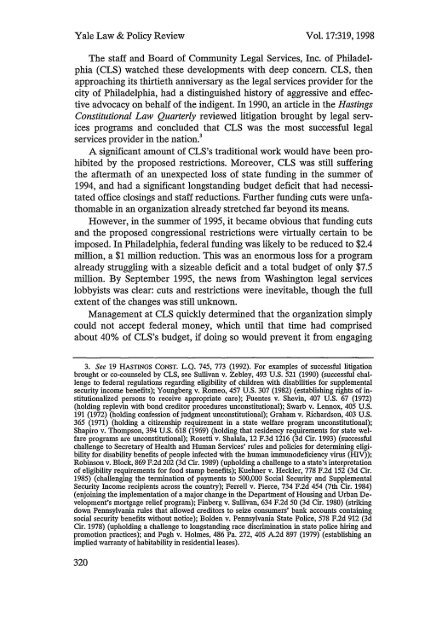Law for The Poor
Law for The Poor
Law for The Poor
Create successful ePaper yourself
Turn your PDF publications into a flip-book with our unique Google optimized e-Paper software.
Yale <strong>Law</strong> & Policy Review<br />
Vol. 17:319, 1998<br />
<strong>The</strong> staff and Board of Community Legal Services, Inc. of Philadelphia<br />
(CLS) watched these developments with deep concern. CLS, then<br />
approaching its thirtieth anniversary as the legal services provider <strong>for</strong> the<br />
city of Philadelphia, had a distinguished history of aggressive and effective<br />
advocacy on behalf of the indigent. In 1990, an article in the Hastings<br />
Constitutional <strong>Law</strong> Quarterly reviewed litigation brought by legal services<br />
programs and concluded that CLS was the most successful legal<br />
services provider in the nation. 3<br />
A significant amount of CLS's traditional work would have been prohibited<br />
by the proposed restrictions. Moreover, CLS was still suffering<br />
the aftermath of an unexpected loss of state funding in the summer of<br />
1994, and had a significant longstanding budget deficit that had necessitated<br />
office closings and staff reductions. Further funding cuts were unfathomable<br />
in an organization already stretched far beyond its means.<br />
However, in the summer of 1995, it became obvious that funding cuts<br />
and the proposed congressional restrictions were virtually certain to be<br />
imposed. In Philadelphia, federal funding was likely to be reduced to $2.4<br />
million, a $1 million reduction. This was an enormous loss <strong>for</strong> a program<br />
already struggling with a sizeable deficit and a total budget of only $7.5<br />
million. By September 1995, the news from Washington legal services<br />
lobbyists was clear: cuts and restrictions were inevitable, though the full<br />
extent of the changes was still unknown.<br />
Management at CLS quickly determined that the organization simply<br />
could not accept federal money, which until that time had comprised<br />
about 40% of CLS's budget, if doing so would prevent it from engaging<br />
3. See 19 HASTINGS CONST. L.Q. 745, 773 (1992). For examples of successful litigation<br />
brought or co-counseled by CLS, see Sullivan v. Zebley, 493 U.S. 521 (1990) (successful challenge<br />
to federal regulations regarding eligibility of children with disabilities <strong>for</strong> supplemental<br />
security income benefits); Youngberg v. Romeo, 457 U.S. 307 (1982) (establishing rights of institutionalized<br />
persons to receive appropriate care); Fuentes v. Shevin, 407 U.S. 67 (1972)<br />
(holding replevin with bond creditor procedures unconstitutional); Swarb v. Lennox, 405 U.S.<br />
191 (1972) (holding confession of judgment unconstitutional); Graham v. Richardson, 403 U.S.<br />
365 (1971) (holding a citizenship requirement in a state welfare program unconstitutional);<br />
Shapiro v. Thompson, 394 U.S. 618 (1969) (holding that residency requirements <strong>for</strong> state welfare<br />
programs are unconstitutional); Rosetti v. Shalala, 12 F.3d 1216 (3d Cir. 1993) (successful<br />
challenge to Secretary of Health and Human Services' rules and policies <strong>for</strong> determining eligibility<br />
<strong>for</strong> disability benefits of people infected with the human immunodeficiency virus (HIV));<br />
Robinson v. Block, 869 F.2d 202 (3d Cir. 1989) (upholding a challenge to a state's interpretation<br />
of eligibility requirements <strong>for</strong> food stamp benefits); Kuehner v. Heckler, 778 F.2d 152 (3d Cir.<br />
1985) (challenging the termination of payments to 500,000 Social Security and Supplemental<br />
Security Income recipients across the country); Ferrell v. Pierce, 734 F.2d 454 (7th Cir. 1984)<br />
(enjoining the implementation of a major change in the Department of Housing and Urban Development's<br />
mortgage relief program); Finberg v. Sullivan, 634 F.2d 50 (3d Cir. 1980) (striking<br />
down Pennsylvania rules that allowed creditors to seize consumers' bank accounts containing<br />
social security benefits without notice); Bolden v. Pennsylvania State Police, 578 F.2d 912 (3d<br />
Cir. 1978) (upholding a challenge to longstanding race discrimination in state police hiring and<br />
promotion practices); and Pugh v. Holmes, 486 Pa. 272, 405 A.2d 897 (1979) (establishing an<br />
implied warranty of habitability in residential leases).

















